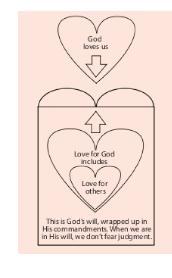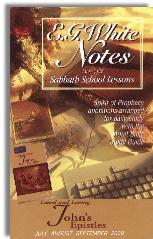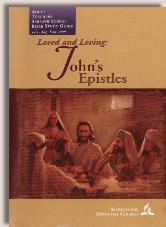|
||||||||||||||
Commentary on "Loving Brothers and Sisters"
Day 6: Thursday, August 20, 2009
Today's lesson is the primary lesson the author has been working toward all week. Here is where the “rubber meets the road.” On page 98 of the Teacher's Quarterly, the section is titled “Love and the commandments.”
The lesson begins with the statement,
Both passages that we have studied this week end with a reference to the commandments.
This is not by accident, the author has specifically designed the lessons this week to lead up to commandment keeping. The word “commandment” or “commandments” occurs a total of 14 times in all of the three letters of John. The words occur on this page of today's lesson quarterly a total of 17 times. The six Biblical references provided for answering the question each contains at least one occurrence of the word, almost half of all the references in the three letters of John.
We will discuss this page, which occurs in all the quarterlies, and one item from page 99 of the Teacher's Quarterly, which includes a graphic that clarifies that to which the author has been leading.
At the bottom of the page for Thursday, we find the following comment:
By switching from the commandment (singular) to the commandments (plural), John may have indicated that the one commandment of love expresses itself in a multiplicity of commandments.
The wording has been expertly crafted to lead you to the keeping of many commandments. We learn of numerous commandments throughout the Old Testament. The Jews accurately counted 613 laws in the Torah. Although they knew the Decalogue, the Ten commandments, the Jews never limited themselves to the ten, but in various ways, attempted to keep all 613. If the lesson author is serious about keeping a plurality of commandments, why stop at ten?
Taking Christians that believe in Jesus and are being led by his Holy Spirit, into a keeping of the commandments has been soundly condemned in the New Testament.
The leading of Christians into the keeping of the law was so anti-Christ, that the Lord had Paul pen the letter to the Galatians to display the true nature of these Judaizers (a Judaizer is one who would attempt to have a Christian start keeping the Old Testament law as given to Israel.)
Galatians 1:8 says that anyone that brings a gospel other than what had already been preached by the Apostles is to be accursed.
But even if we, or an angel from heaven, should preach to you a gospel contrary to what we have preached to you, he is to be accursed!
That is strong language, but it doesn't stop there. How is one referred to in scripture when they started as a Christian and then started keeping the law? Galatians 3:1-5 reads:
You foolish Galatians, who has bewitched you, before whose eyes Jesus Christ was publicly portrayed as crucified? 2 This is the only thing I want to find out from you: did you receive the Spirit by the works of the Law, or by hearing with faith? 3 Are you so foolish? Having begun by the Spirit, are you now being perfected by the flesh? 4 Did you suffer so many things in vain-- if indeed it was in vain? 5 So then, does He who provides you with the Spirit and works miracles among you, do it by the works of the Law, or by hearing with faith?
This strong language is continued in verses 10-13 of Galatians 3:
For as many as are of the works of the Law are under a curse; for it is written, "CURSED IS EVERYONE WHO DOES NOT ABIDE BY ALL THINGS WRITTEN IN THE BOOK OF THE LAW, TO PERFORM THEM." 11 Now that no one is justified by the Law before God is evident; for, "THE RIGHTEOUS MAN SHALL LIVE BY FAITH." 12 However, the Law is not of faith; on the contrary, "HE WHO PRACTICES THEM SHALL LIVE BY THEM." 13 Christ redeemed us from the curse of the Law, having become a curse for us-- for it is written, "CURSED IS EVERYONE WHO HANGS ON A TREE." (Emphasis in original NASB passage.)
From this passage in Galatians, we can see the rejection of the practices of the law, commandment-keeping. These Galatians are called “foolish,” “bewitched,” “[attempting to be] perfected by the flesh,” “in vain,” “cursed.” The Galatians, due to their practice of one law, are to keep “all things written in the law,” yet know that “no one is justified by the Law,” because “the Law is not of faith” and it is a “curse.”
Nowhere is the law referred to as being “bad.” That is not the intent of this commentary. The intent is to show that the law had a purpose, for a specific period of time, and that time has ended. Galatians is also clear about this. Galatians 3:17-19 tells us this time period:
What I am saying is this: the Law, which came four hundred and thirty years later, does not invalidate a covenant previously ratified by God, so as to nullify the promise. For if the inheritance is based on law, it is no longer based on a promise; but God has granted it to Abraham by means of a promise. Why the Law then? It was added because of transgressions, having been ordained through angels by the agency of a mediator, until the seed would come to whom the promise had been made.
The commendments of God were given to the Israelites 430 years after Abraham. They were “added” because of transgressions. They were added “until” the seed would come, that seed being Jesus Christ. That means that during Christ's life on Earth, the law was completed. Jesus made this pronouncement from the cross when he declared, “It is finished.”
Following all of this, Paul states in relation to the commendment of circumcision, in Galatians 5:12, that “I wish that those who are troubling you would even mutilate themselves.”
At the bottom of today's lesson, the author asks a some questions.
How can we experience God’s commandments as something more than a set of rules. Is that all they are? Or are they something more?
They were definitely more than a set of rules. God's purpose was to prepare the nation of Israel for the coming of the Messiah. It was a “ministry of death” to lead them to the author of Life. 2 Corinthians 3:7 reads in part, “the ministry of death, in letters engraved on stones.” The answers to the questions posed in this lesson can best be answered by avoiding commandment-keeping as an act of righteousness.
 We now turn to a section from the Teacher's Quarterly, page 99. A graphic is provided that attempts to express visually what has been presented in the lesson verbally. The graphic seems to indicate that God's love comes down to us, and that our response to him is based on our following the Ten commandments as a fulfillment of our love toward God and toward others.
We now turn to a section from the Teacher's Quarterly, page 99. A graphic is provided that attempts to express visually what has been presented in the lesson verbally. The graphic seems to indicate that God's love comes down to us, and that our response to him is based on our following the Ten commandments as a fulfillment of our love toward God and toward others.
The statement on the graphic, “This is God's will, wrapped up in His commandments” is patently false. God's will was “wrapped up” in Jesus Christ. Having quoted this before, may we simply remind you of the reference to Hebrews 1:1-3. (God used to speak through prophets, but he does not work through prophets anymore, he works through his son, Jesus. There is a New Testament gift of prophecy, but that is not to be confused with the Old Testament office of the prophet. Those are two very distinct roles of believers in scripture.)
Why is the judgment mentioned on this graphic? Because, with the law, judgment is another pillar of the Seventh-day Adventist message. It is a complete package. Without the Investigative Judgment there would be no need for commandment-keeping. It is only through perfect commandment-keeping that one can live in the time of the Investigative Judgment (going on now, since Oct. 22, 1844) without fear. If the commandments are not kept perfectly, the Investigative Judgment is truly something to fear.
But we need not fear, because we have been released from the curse of the law, Jesus having become the curse for us! (See Gal. 3:13.)
Summary
- The authors original intent comes into clear focus in todays lesson: commandment-keeping
- John is not saying that “one commandment of love expresses itself in a multiplicity of commandments.”
- The Torah, the five books of Moses, as they are called, contain 613 commandments. If love is expressed in multiplicity, what better way than to attempt to keep all 613? Of course, that would be ridculous, given the warnings in the letter to the Galatians.
- It is a perversion of the gospel message to lead Christians into the keeping of the Old Testament law.
- The Galatians are called “foolish,” “bewitched,” “[attempting to be] perfected by the flesh,” “in vain,” “cursed.”
- The Galatians, due to their practice of one law, are to keep “all things written in the law,” yet know that “no one is justified by the Law,” because “the Law is not of faith” and it is a “curse.”
- The law is not bad. The law is holy, just and good.
- The law was given for a specific period of time, as described in Galatians 3:17-19.
- The ongoing purpose of the Sabbath School Quarterly lesson author has become clear in today's lesson.
- The graphic in the Teacher's Quarterly clarifies what the author has been working towards.
- The graphic refers to the judgment. This must be understood as the Investigative Judgment, taught only by the Seventh-day Adventist Church.
- If one keeps the law perfectly, the Investigative Judgment is not to be feared.
- We need not fear, for we have been released from the curse of the law, Jesus having become the curse for us!
Copyright 2009 BibleStudiesForAdventists.com. All rights reserved. Revised August 18, 2009. This website is published by Life Assurance Ministries, Glendale, Arizona, USA, the publisher of Proclamation! Magazine. Contact email: BibleStudiesForAdventists@gmail.com.
The Sabbath School Bible Study Guide and the corresponding E.G. White Notes are published by Pacific Press Publishing Association, which is owned and operated by the Seventh-day Adventist church. The current quarter's editions are pictured above.
Official Adventist Resources
Standard Edition Study Guide Week 8
Teacher's Edition Study Guide Week 8
Easy Reading Edition Study Guide Week 8
Search the Complete Published Ellen G. White Writings


